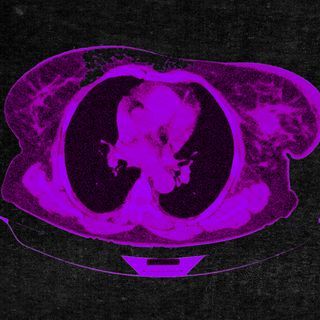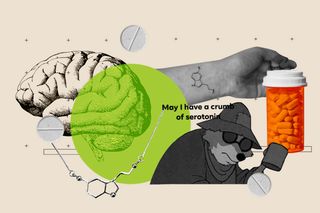
How Serotonin Became the Internet’s Symbol for Hope and Happiness
Joking about this neurotransmitter’s role in keeping us happy is a familiar community coping mechanism.

What does one need to make it through the day? During a devastating pandemic, a single “crumb” of serotonin is enough, if you ask the Internet. The neurotransmitter, often credited with birthing the study of neuroscience, now shoulders the collective happiness of a wiped-out, wisecracking online audience. Characters ranging from Oliver Twist to Robin Hood beg for a crumb of serotonin to make it through the day in viral memes, and the body’s biological processes are mercilessly roasted for their ineptitude in serotonin production.
Of all the neurotransmitters available — including dopamine, which is also associated with happiness — the choice of serotonin to become shorthand for happiness betrays a complexity beyond its mere affect on mood. The rise of the term serotonin’s popularity is linked to selective serotonin reuptake inhibitors (SSRI) being the most popular type of prescribed antidepressants.
The global antidepressant market was valued at $14,538 million in 2020 — painting a clear picture of the rise in awareness of and seeking care for mental health issues. As openness about mental health increased over the past two decades, so did people’s willingness to talk about it — especially on the Internet, where many could enjoy anonymity. One of the first serotonin memes was created by comic-artist duo Toothpaste for Dinner in 2011. Their meme said, “Serotonin and dopamine == Technically the only two things you enjoy.” More gifs, memes, and reaction images involving serotonin started showing up in a Reddit forum called r/2meirl4meirl, a community for people living with clinical depression. Over the next decade, these memes moved from niche internet forums to large social media platforms to the word serotonin itself imbibing a certain purity. If you had to describe a good day, or even a really adorable baby video, you’d say it was free serotonin, a serotonin surge, or, in some cases, better than serotonin!
Related on The Swaddle:
From Open Books to Locked Accounts: Inside the World of Finstas and Alt Twitters
Within the human body, serotonin is responsible for stabilizing our mood. But the science behind what neurotransmitters like serotonin and dopamine actually do is a touch more complicated than popular perception. Low amounts of serotonin in the system do not cause depression. Some doctors and scientists do believe that abnormal serotonin amounts in the brain are related to a depressive condition, but there’s no research or data that suggests a direct correlation. In fact, scientists suggest that framing depression as a deficiency has made patients more amenable to taking antidepressants, which is also where the origin of equating serotonin with a cure for depression lies.
With serotonin becoming an almost-euphemism for joy now, several internet posts about the neurotransmitter serve a far more vital purpose — they are a coping mechanism. Research has shown that dark humor linked to personal distress can reduce feelings of despair, making it easier to look for a solution. However, the popularity of serotonin memes has led to a rise in “hacks” to increase serotonin in the system. While research states that certain triggers like sunlight, exercise, diet, and assisted mood alterations via talk therapy can increase a little serotonin in our system in roundabout ways, it is not a cure for depression.
Related on The Swaddle:
Suicidal Thoughts Exist on a Spectrum — And Sometimes Involve No Active Plans to Die
But, serotonin’s contemporary popularity is also linked to its perception as a survival aid. While dopamine is well-revered by members of the exercise fraternity and individuals in Silicon Valley for the rush of exhilaration it provides, people value serotonin for its ability to keep them functioning through the day. This is clear in how serotonin is quantified by the Internet — a single crumb or one molecule won’t bring them joy, but seems enough to get them up from the bed.
The power of a shared language of solidarity around mental illness lies in its ability to destigmatize and offer community. The social isolation that long accompanied mental illnesses like depression has cracked partly due to distressed individuals’ ability to jest about their struggles, ultimately choosing vulnerability over masked tolerance. In admitting our weakness and exhaustion by asking for a “crumb” of serotonin, we let go and acknowledge that the world is not quite right around us, allowing us to accept that it’s not all in our heads. Our ability to laugh about it can help us hold it together.
Aditi Murti is a culture writer at The Swaddle. Previously, she worked as a freelance journalist focused on gender and cities. Find her on social media @aditimurti.
Related


Waking Up Early Is Linked to Reduced Risk of Depression, Research Suggests
